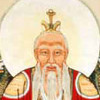“ Far best is he who knows all things himself; Good, he that hearkens when men counsel right; But he who neither knows, nor lays to heart Another's wisdom, is a useless wight. ”
Aristotle, Nicomachean Ethics (c. 334 BC - 330 BC). copy citation
| Author | Aristotle |
|---|---|
| Source | Nicomachean Ethics |
| Topic | wisdom heart |
| Date | c. 334 BC - 330 BC |
| Language | English |
| Reference | |
| Note | Translated by W. D. Ross |
| Weblink | http://classics.mit.edu/Aristotle/nicomachaen.mb.txt |
Context
“For the fact is the starting-point, and if this is sufficiently plain to him, he will not at the start need the reason as well; and the man who has been well brought up has or can easily get startingpoints. And as for him who neither has nor can get them, let him hear the words of Hesiod:
Far best is he who knows all things himself;
Good, he that hearkens when men counsel right;
But he who neither knows, nor lays to heart
Another's wisdom, is a useless wight.
5
Let us, however, resume our discussion from the point at which we digressed. To judge from the lives that men lead, most men, and men of the most vulgar type, seem (not without some ground) to identify the good, or happiness, with pleasure;”
source


